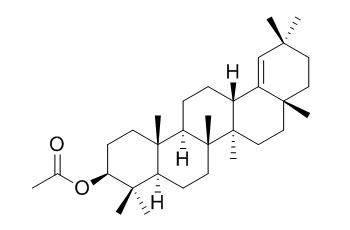Germanicol acetate
Germanicol acetate shows some slight cytotoxic activity against Jurkat cells .
Inquire / Order:
manager@chemfaces.com
Technical Inquiries:
service@chemfaces.com
Tel:
+86-27-84237783
Fax:
+86-27-84254680
Address:
1 Building, No. 83, CheCheng Rd., Wuhan Economic and Technological Development Zone, Wuhan, Hubei 430056, PRC
Providing storage is as stated on the product vial and the vial is kept tightly sealed, the product can be stored for up to
24 months(2-8C).
Wherever possible, you should prepare and use solutions on the same day. However, if you need to make up stock solutions in advance, we recommend that you store the solution as aliquots in tightly sealed vials at -20C. Generally, these will be useable for up to two weeks. Before use, and prior to opening the vial we recommend that you allow your product to equilibrate to room temperature for at least 1 hour.
Need more advice on solubility, usage and handling? Please email to: service@chemfaces.com
The packaging of the product may have turned upside down during transportation, resulting in the natural compounds adhering to the neck or cap of the vial. take the vial out of its packaging and gently shake to let the compounds fall to the bottom of the vial. for liquid products, centrifuge at 200-500 RPM to gather the liquid at the bottom of the vial. try to avoid loss or contamination during handling.
Nat Prod Sci.2018, 24(3):206
Molecules.2023, 28(3):1313.
Plant Biotechnol (Tokyo).2024, 41(3):267-276.
Molecules.2015, 20(10):19172-88
J Food Biochem.2020, 44(6):e13198.
Food Chem.2022, 378:131975.
Front. Physiol.2022, 790345.
Aging (Albany NY).2023, 15(24):15557-15577.
International Food Research Journal2018, 25(6):2560-2571
Nat Commun.2023 Dec 20;14(1):8457.
Related and Featured Products
J Ethnopharmacol. 2016 May 13;183:29-37.
Cytotoxic biomonitored study of Euphorbia umbellata (Pax) Bruyns.[Pubmed:
26906968 ]
Euphorbia umbellata latex (sap) has normally been used in folk medicine in southern Brazil to treat different types of cancers.
To carry out a biomonitored investigation of partitioned latex using in vitro assay, to identify the main mechanisms related with the action of the most active fraction as well as to develop a phytochemical study with this material.
METHODS AND RESULTS:
Biological screening was performed with hexane, chloroform, ethyl acetate and methanol fractions from the latex of E. umbellata using MTT, trypan blue, and neutral red assays to determine the cytotoxicity against HRT-18, HeLa and Jurkat cells and flow cytometry, DNA quantification, acridine orange and Hoechst 33342 staining to investigate mechanisms of action for the hexane extract. The phytochemical study of the hexane fraction was performed by chromatographic procedures and the substances were identified by NMR analysis. The isolated terpenes were evaluated using MTT to determine the cytotoxicity against Jurkat cells.
All the fractions presented concentration and time dependent cytotoxicity. The hexane fraction showed the highest cytotoxicity; whereas the Jurkat cell was the lineage with the highest sensitivity (IC50 1.87µg/mL). Fragmentation of DNA and apoptosis are two mechanisms related with the toxicity of hexane fraction. The hexane fraction arrested the cell cycle in the G0/G1 phase, and the selectivity index was 4.30. Phytochemical study of the hexane fraction led to isolation of euphol (main compound) and Germanicol acetate. Both substances demonstrated some slight cytotoxic activity against Jurkat cells after 72h; however the activity was minimal compared to vincristine (anticancer standard drug).
CONCLUSIONS:
The current research proves that the fractions of the latex from E. umbellata have a cytotoxic effect against three different cancer cells lines. The hexane fraction showed high in vitro cytotoxic effects against Jurkat cells demonstrating that the effect may be due to non-polar constituents. The two isolated terpenes (euphol and Germanicol acetate) showed poor cytotoxic activity indicating that the anticancer properties of the extract may be caused by other substances present in the hexane fraction.
Saudi Pharm J. 2014 Nov;22(5):460-71.
Phytochemical and pharmacological study of Ficus palmata growing in Saudi Arabia.[Pubmed:
25473335 ]
Phytochemical study of the aerial parts of Ficus palmata utilizing liquid-liquid fractionation and different chromatographic techniques resulted in the isolation of a new isomer of psoralenoside namely, trans-psoralenoside (5) in addition to, one triterpene: Germanicol acetate (1), two furanocoumarins: psoralene (2), bergapten (3), one aromatic acid vanillic acid (4) and the flavone glycoside rutin (6).
METHODS AND RESULTS:
Structures of the isolated compounds were established through physical, 1D- and 2D-NMR and MS data. The total extract and fractions of the plant were examined in vivo for its possible effects as hepatoprotective, nephroprotective, antiulcer and anticoagulant activities in comparison with standard drugs. Hepatoprotective activity was assessed via serum biochemical parameters including aspartate aminotransferase (AST), alanine aminotransferase (ALT), gamma glutamyl transpeptidase (GGT), alkaline phosphatase (ALP) and total bilirubin. Tissue parameters such as non-protein sulfhydryl groups (NP-SH), malonaldehyde (MDA) and total protein (TP) were also measured. In addition to tissue parameters, nephroprotective effect was evaluated by measuring the serum levels of sodium, potassium, creatinine and urea. Histopathological study for both liver and kidney cells was also conducted. Antiulcer activity was explored by observing stomach lesions after treatment with ethanol. Whole blood clotting time (CT) was taken as a measure for the anticoagulant activity of the extract. Antioxidant activity of the total extract and fractions of the plant was measured using 2,2-diphenyl-1-picrylhydrazyl (DPPH) method and ascorbic acid as standard.



